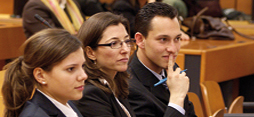

International Expert Programme in Investigative and Legal Psychology
Programme Structure and Faculty
Structure
The academic curriculum of the International Expert Programme in Investigative and Legal Psychology is divided into the following phases.
I. Residential phase (March - June)
The residential phase will open with an initial week during which participants will get acquainted with their peers through ice breaking and intercultural communication exercises. The content and structure of the course will be thoroughly explained and practical information will be provided. An entry test on the training material submitted in January and to be studied from distance will be administered.
From the second week students will be guided to explore the psychological and legal dimensions of criminal cases related to:
- Child sexual abuse;
- Murder;
- International/transnational crimes.
In this phase external lecturers and expert practitioners will provide students with valuable insights into forensic concepts such as:
- Research methods and basic statistics;
- Principles of comparative criminal law and criminal procedures;
- Basic introduction to forensic psychology;
- Expert witness;
- Examination and cross-examination techniques;
- Aetiology of criminal conduct;
- Offender profiling;
- Forensic investigation techniques;
- Crime scene investigation;
- Crime linkage and crime scene behaviour;
- Strategic use of evidence during criminal trials ;
- Detection of deception;
- Bayesian reasoning and decision support;
- Interviewing techniques with adults and minors;
- False confessions;
- Decision-making processes and errors in judicial and forensic contexts;
- The neurobiological basis of offending;
- Actuarial risk assessment;
- Behaviour genetics of crime and crime defence
- Aetiology, assessment, forensic relevance of psychological disorders.
At the end of each module students will be evaluated through a final group exercise such as a debate or a trial simulation. Students will also produce essays and reports that will contribute to their final grade.
Aim of this phase: guide students in the theoretical and practical understanding of the interaction between law and psychology by addressing various forms of crime. Foster the acquisition of practical skills and the application of theoretical concepts in realistic forensic contexts.
II. Final Research Phase (June - September)
Students will work on the preparation of a final research paper and may choose whether to remain in Turin or return home. Final grades will be communicated at the beginning of October and diplomas will be awarded during the month of October.
Aim of this phase: allow students to apply the knowledge, research and academic skills acquired during the course.
Faculty & Members of the Scientific Committee
The Faculty of the International Expert Programme in Investigative and Legal Psychology is composed by leading academics, experts and practitioners in the field of Forensic Psychology and related subjects. The previous edition involved the following members:
Jan Peter Antfolk
Member of the Scientific Committee and Scientific Director of the Programme.
Post-doctoral Researcher, Åbo Akademi University.
Academic expertise in: Sexual abuse; violence and abuse within the family; false confessions; behaviour genetics of crime and crime defense; extra judicial factors and cognitive errors in decision making.
Anthony Beech
Member of the Scientific Committee and Co-Director of the Programme.
Emeritus Professor in Criminological Psychology; Head of the Centre for Forensic and Criminological Psychology, University of Birmingham.
Academic expertise in: criminal psychology, risk assessment, neurobiological bases of offending, reducing online exploitation of children, psychotherapeutic effectiveness of offenders’ treatment.
Gershon Ben-Shachar
Professor of Psychology and Former Chair, Department of Psychology, Former Vice Rector, The Hebrew University of Jerusalem; Former President, The Open University of Israel.
Leading expert in: psychophysiological and behavioural measures for the detection of deception.
Dawn Fisher
Registered Forensic Clinical Psychologist, St. Andrew’s Healthcare, Birmingham.
Professional expertise: psychotherapeutic offenders’ treatments.
Viola Galleano
Registered Psychologist, Cognitive-Constructivist Psychotherapist, Eye Movement Desensitization and Reprocessing (EMDR) Therapist.
Professional expertise: diagnosis and treatment of Post Traumatic Stress Disorder (PTSD) and complex trauma disorders.
Pär Anders Granhag
Member of the Scientific Committee
Full Professor, Department of Psychology, University of Gothenburg; Former President European Association of Psychology & Law; Funding Coordinator Nordic Network for Research on Psychology & Law.
Academic and professional expertise: detection of deception, eyewitness testimony and investigative psychology, interviewing and interrogation techniques.
Giampietro Lago
Col. National Italian Military Police Force of Carabinieri; Head, Scientific Investigation Section of Parma Department.
Academic and professional Expertise: forensic investigation, forensic biology, law.
Andreas Mokros
Research Psychologist, Department for Forensic Psychiatry, University Hospital of Psychiatry of Zurich.
Academic and professional expertise: psychopathy (aetiology, assessment, and violence risk), indirect assessment of paedophilic sexual preference, quantitative methods (taxometrics, Bayesian methods, and behavioural genetics).
Pekka Santtila
Scientific Director of the Programme
Former Dean & Full Professor of Applied Psychology, Faculty of Arts, Psychology and Theology, Åbo Akademi University.
Visiting Professor of Psychology at the New York University (Shanghai)
Academic and professional expertise: forensic psychology, behavioural genetics, witness psychology, child sexual abuse, offender profiling.
Petrus van Koppen
Member of the Scientific Committee
Full Professor of Law and Psychology, Departments of Law, Maastricht University and Free University Amsterdam; Former President, European Association for Psychology and Law.
Academic and professional expertise: legal psychology, decision-making processes and errors in judicial and forensic context, false confessions, use of evidence in criminal trials.
Jessica Woodhams
Member of the Scientific Committee
Senior Lecturer of Forensic Psychology, University of Birmingham; Former Crime Analyst, Metropolitan Police in London; Founder, C-LINK (Crime Linkage International NetworK).
Academic and professional expertise: behavioural linking of crimes, offender prioritisation and investigative risk assessment, offender profiling, identification of false allegations, sexual and serial offending.
Angelo Zappalà
Member of the Scientific Committee
Professor of Psychology of Deviance and Criminology, IUSTO; Head, Specialised School of Cognitive and Behavioural Therapy in Clinical and Forensic Contexts of Turin.
Academic and professional expertise: offender profiling, behavioural crime linking, geographical profiling, child sexual abuse investigation, methods of assessing deviant sexual preferences.
Furthermore, participants will be guided in their group work activities and provided ad hoc support by a number of tutors from Åbo Akademi and other Universities.




